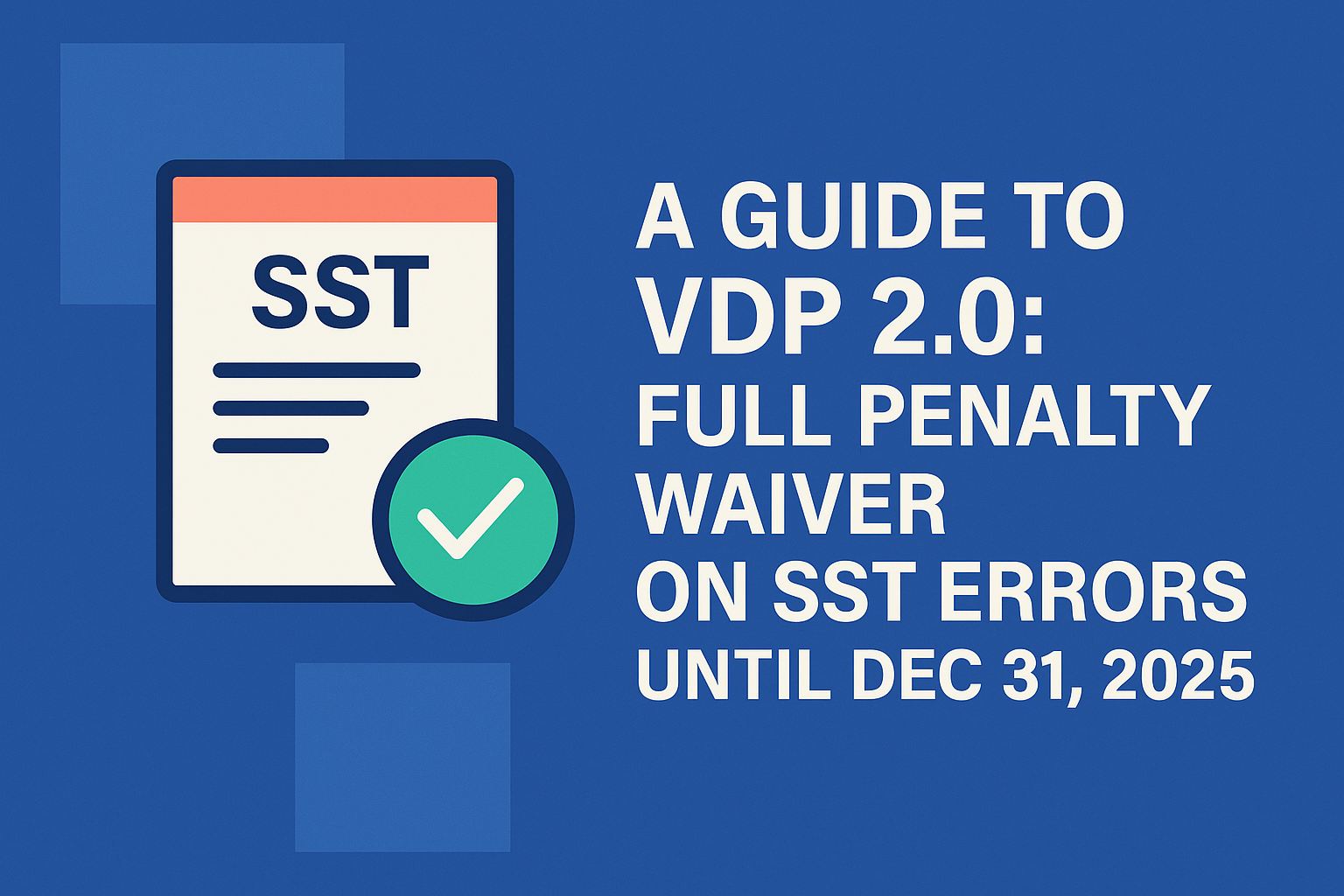The Royal Malaysian Customs Department (RMCD / KASTAM) has launched a crucial initiative for all Malaysian businesses: the Voluntary Disclosure Programme 2.0 (VDP 2.0) for indirect taxes. This program presents a golden opportunity for companies to voluntarily declare any past underpayments or errors related to Sales Tax and Service Tax (SST) and receive a 100% remission on all penalties.
Given the complexities of SST regulations, especially for industries like construction, education, and healthcare, many businesses may have unknowingly made errors. This VDP is your chance to come clean and regularize your tax position without a heavy financial penalty. But the window is limited.
What is the Voluntary Disclosure Programme (VDP) 2.0?
VDP 2.0 is essentially a tax amnesty program. It encourages businesses to conduct an internal review of their SST compliance and voluntarily report any discrepancies to RMCD. In return for this honesty and proactivity, the government offers a full waiver on penalties that would otherwise be imposed.
Who Should Consider This Programme?
This programme is for any business that suspects or has found errors in their past SST compliance. According to the guidelines, this covers common mistakes such as:
- Late SST registration (i.e., you passed the threshold but did not register on time).
- Late submission of SST-02 returns.
- Underpayment of SST due.
- Errors on invoices, credit notes, or debit notes.
The Conditions for a Full Penalty Waiver
To enjoy the 100% penalty waiver, you must meet these critical conditions:
- It MUST Be Voluntary: You must declare the error to RMCD before they initiate any audit or investigation against your company. Once an audit has begun, you are no longer eligible for the VDP.
- It Is Not for Fraud or Evasion: This program does not cover cases of willful tax evasion or fraudulent activities.
- A Formal Application is Required: You must formally apply to RMCD to participate in the VDP. It is not an automatic process.
The penalty remission period is valid for disclosures made until December 31, 2025.
Industry-Specific Complexities (Construction, Education, etc.)
The government recognizes that SST rules can be complex for specific industries, often leading to unintentional errors. For example:
- Construction: The SST treatment can vary based on whether the project is for a government body or a private entity, and whether the contract is “reviewable.”
- Education: Certain items like textbooks, food, and accommodation provided by educational institutions are exempt from SST, but only if they are not considered part of the main school fees.
- Healthcare: The taxability of private healthcare services is another area that requires careful classification.
These specific rules can easily lead to the types of errors that the VDP is designed to help businesses correct.
How to Take Action Before the Deadline
- Conduct an Internal SST Health Check: Thoroughly review your financial records and SST filings from previous years. Check your registration date, the accuracy of your returns, and the correctness of your invoices.
- Quantify Any Discrepancies: If any errors are found, accurately calculate the total amount of SST that was underpaid.
- Apply for VDP 2.0: Contact RMCD through their official channels, such as the MySST portal, to formally declare the errors and apply for the programme before an audit is initiated.
How SMONE Can Help You Seize This Opportunity
Conducting a comprehensive review of your past SST compliance can be a daunting task. The key to successfully utilizing the VDP is a thorough and accurate assessment of your financial records.
At SMONE, our Tax Compliance and Accounting experts can help you perform a detailed SST health check. We can:
- Identify any past errors or areas of non-compliance.
- Accurately quantify any tax shortfall.
- Guide you in preparing the necessary documentation for your VDP application.
Don’t let this opportunity pass. The cost of correcting a mistake under the VDP is only the tax itself, whereas the cost after an audit can be many times higher due to penalties. Contact us for a confidential consultation today.
(Disclaimer)
This article is for general informational purposes. It does not constitute legal or tax advice. Please consult with a qualified tax professional for advice tailored to your specific situation and refer to official RMCD circulars for complete VDP 2.0 details.


